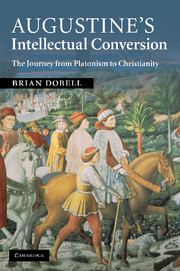Book contents
- Frontmatter
- Contents
- Preface
- Note on translations and references
- Chronological table of Augustine's writings
- List of abbreviations and texts
- Introduction: Augustine's conversion to Christianity
- PART I THE WAY OF AUTHORITY AND ‘THE FALSITY OF PHOTINUS’
- PART II THE WAY OF REASON AND THE ASCENT OF THE SOUL
- 3 The way of reason
- 4 The problem of evil and the development of Augustine's metaphysics
- 5 The graded ascent
- 6 The rejection of Platonic ascent
- 7 The Ostia ascent
- Conclusion: Augustine the Porphyrian
- Appendix: true and false in Soliloquies II
- Bibliography
- Index
4 - The problem of evil and the development of Augustine's metaphysics
Published online by Cambridge University Press: 01 June 2010
- Frontmatter
- Contents
- Preface
- Note on translations and references
- Chronological table of Augustine's writings
- List of abbreviations and texts
- Introduction: Augustine's conversion to Christianity
- PART I THE WAY OF AUTHORITY AND ‘THE FALSITY OF PHOTINUS’
- PART II THE WAY OF REASON AND THE ASCENT OF THE SOUL
- 3 The way of reason
- 4 The problem of evil and the development of Augustine's metaphysics
- 5 The graded ascent
- 6 The rejection of Platonic ascent
- 7 The Ostia ascent
- Conclusion: Augustine the Porphyrian
- Appendix: true and false in Soliloquies II
- Bibliography
- Index
Summary
The first ascent is described in one paragraph (7.10.16), and the second ascent in another (7.17.23). Between these two paragraphs Augustine spends fully six paragraphs recounting his reflections upon the nature of being (7.11.17), the relationship between being and goodness (7.12.18), the nature of good and evil (7.12.18–7.13.19), the nature of the true and the false (7.15.21) and the nature of sin (7.16.22). For the most part, scholars seem to regard these six paragraphs as filler, if their almost complete neglect in the literature is any indication (a neglect that is all the more conspicuous given the attention lavished upon the ascents themselves). This is very puzzling. On the face of it, these paragraphs would seem to offer a wealth of important material relating to Augustine's intellectual development. Has this potential treasure chest gone largely untouched because of the widespread assumption that the period of time separating Augustine's discovery of the ‘books of the Platonists’ (7.9.13) from his ‘Pauline revolution’ (7.21.27) was no more than a few months? Of course, I argued in part i that this view of Augustine's development must be rejected. We are not relying upon that argument here; nevertheless, it is clear that the significance of these six paragraphs must be examined afresh. Is it possible that the author of the Cassiciacum dialogues is not yet the person who has resolved the issues described in these six paragraphs?
- Type
- Chapter
- Information
- Augustine's Intellectual ConversionThe Journey from Platonism to Christianity, pp. 138 - 182Publisher: Cambridge University PressPrint publication year: 2009

